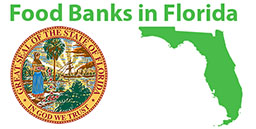About Us
Food Banks in Florida
Food Banks in Florida is a 501 (c)(3) non-profit recognized by the IRS.
Tax ID Number: 93-3238332
Our address is: 1601-1 N MainStreet #3159, Jacksonville FL 32206
To Contact Us Click Here
Find a Food Bank in Florida
To help you Find a Food Bank in Florida we have put together a list of all the Food Pantries, Food Banks and Soup Kitchens in Florida. We noticed that some sites only list the food pantries that they are affiliated with or members of which limits the number of food pantries in each area.
We wanted to list all pantries no matter which non profit they are aligned with. We felt that this was a better way to help people in need find the most convenient food pantry to visit.
If you see that we are missing a food bank location or if we have incorrect information for a pantry listed click here to send us the correct info. We will add or update the current info we have as soon as we verify the information with the location.
Food Insecurity in Florida: Nourishing a State in Need
Florida, renowned for its sunshine and thriving tourism industry, hides a significant issue beneath its vibrant surface—food insecurity. Despite its allure, the Sunshine State faces the harsh reality of inadequate access to sufficient, safe, and nutritious food for a substantial portion of its population. This essay explores the causes, consequences, and potential solutions to address food insecurity in Florida. By shining a light on this pressing issue, we can work towards ensuring food security for all Floridians.
Understanding Food Insecurity in Florida
Food insecurity affects individuals and households across Florida, transcending geographical boundaries and demographics. It refers to the limited or uncertain availability of nutritionally adequate and safe food, or the inability to acquire enough food to meet one’s dietary needs. According to Feeding America’s “Map the Meal Gap” report, in 2020, approximately 12.5% of Florida’s population, equivalent to over 2.5 million people, experienced food insecurity.
Causes of Food Insecurity in Florida
Various factors contribute to the prevalence of food insecurity in Florida. One key factor is the state’s high poverty rate. According to the U.S. Census Bureau, in 2020, Florida’s poverty rate stood at 12.7%, surpassing the national average. Poverty often limits individuals’ purchasing power, forcing them to allocate a significant portion of their income towards other necessities, leaving insufficient funds for adequate and nutritious food.
Additionally, limited access to affordable and nutritious food exacerbates the problem. Many communities in Florida, particularly in rural and low-income areas, lack grocery stores or have limited options, resulting in food deserts. This lack of access to fresh produce and healthy food options makes it challenging for residents to maintain a balanced diet, leading to higher rates of food insecurity.
Consequences of Food Insecurity in Florida
Food insecurity has severe consequences for individuals, families, and communities in Florida. One of the immediate effects is malnutrition, which can lead to various health issues, including stunted growth, weakened immune systems, and developmental delays, particularly in children. Food-insecure individuals are also more susceptible to diet-related diseases such as obesity, diabetes, and cardiovascular problems.
Food insecurity strains the healthcare system. Individuals experiencing food insecurity are more likely to rely on emergency services and experience higher healthcare costs due to a lack of preventive care and chronic disease management. The economic impact is significant as well, with decreased productivity and increased healthcare expenses placing a burden on both individuals and the state.
Addressing Food Insecurity in Florida
Efforts to combat food insecurity in Florida require a multi-faceted and collaborative approach. Here are some potential solutions:
- Strengthening and expanding federal nutrition assistance programs such as the Supplemental Nutrition Assistance Program (SNAP) and the Special Supplemental Nutrition Program for Women, Infants, and Children (WIC), to ensure eligible individuals and families receive adequate support.
- Investing in and promoting community-based initiatives such as food banks, food pantries, and meal programs to provide immediate relief and support for food-insecure individuals and families.
- Increasing access to affordable and nutritious food by incentivizing the establishment of grocery stores, farmers’ markets, and mobile markets in underserved areas, through tax incentives or subsidies.
- Expanding school meal programs to ensure that all children have access to nutritious meals during the school day, and investing in summer and afterschool meal programs to bridge the food gap during non-school months.
- Encouraging partnerships between farmers, food producers, and retailers to increase the availability of locally grown produce and support sustainable agriculture, benefiting both the economy and food access.
Click Here to Search for a Food Bank in Florida



